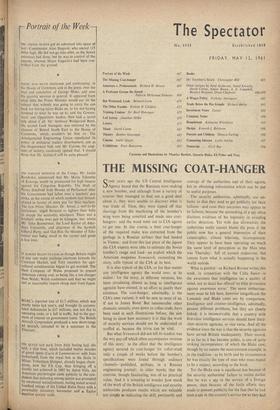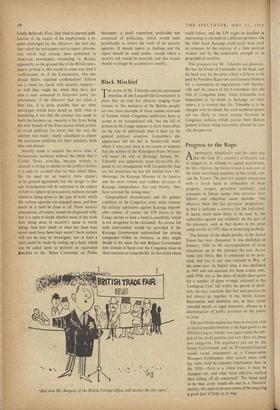THE MISSING COAT-HANGER
It is also typical of the CIA, or for that matter any intelligence agency the world over, at its stalest: for the story, in different versions, has been circulating almost as long as intelligence agencies have existed, in an effort to justify their existence. The coat-hanger, admittedly, is the CIA's own variant; it will be new to most of us, if not to James Bond.' But innumerable other domestic utensils, even down to collar-studs, have been used in such illustrations before; the aim being to show how necessary it is that the work of security services should not be underrated or scoffed at, because the trivia can be vital.
But what Newsweek did not tell its readers was the wry pay-off which often accompanies versions of this story: to the effect that the intelligence agency secured its coat-hanger (or collar-stud) only a couple of weeks before the bomber's specifications were found through ordinary channels—published, perhaps, in a Russian engineering journal: in other words, that the exercise, though fascinating, was of no practical value. And it is tempting to wonder pow much of the work of the British intelligence and security authorities produces results which are valuable not simply as indicating the skill, pertinacity and
courage of the authorities and of their agents, but in obtaining information which can be put to useful purposes.
The security authorities, aclniittedly, are un- I uck y in that they tend to get publicity for their failures—and even their successes may appear to be failures, because the unmasking of a spy often discloses evidence of his ingenuity in avoiding earlier detection. Yet with due allowances, the authorities really cannot blame the press if the public now has a general impression of their catastrophic, almost hilarious, incompetence. They appear to have been operating on much the same level of perception as the Man who was Thursday: full of earnest endeavour, but remote from what is actually happening in the world outside.
What is painful—as Richard Rovere writes this week, in connection with the Cuba fiasco—is the awareness that intelligence (as a quality of mind, not as data) has offered `so little protection against enormous error.' The same embarrass- ment must be felt here, however insignificant the Lonsdale and Blake cases are by comparison. Intelligence and counter-intelligence, admittedly, present different problems, but they are closely linked; it is inconceivable that a country with first-class intelligence services should have third- class security agencies, or vice versa. And all the evidence since the war is that the security agencies have served Britain inadequately. Their record, in so far as it has become public, is one of quite striking incompetence; of which the Blake case, though by no means the most extreme example, is in the tradition—as by birth and by circumstance he was exactly the type of man who must expect to be a suspect, according to the book.
Yet the Blake case is significant less because of the security authorities' failure to realise earlier that he was a spy in the service of a foreign power, than because of the futile efforts they made to prevent publicity for the fact that he had been a spy in this country's service (or so they had fondly believed). First, they tried to prevent pub- lication of the nature of his employment, a re- quest challenged by the Observer, the next day they asked the newspapers not to report informa- tion which had already been published in American newspapers circulating in Britain, apparently on the ground that if the Britigh news- papers printed it, this would in some way lend it confirmation. As if the Communists, who em- ployed Blake, required confirmation! Editors are a timid lot, faced with security requests— as well they might be, when they haye just seen a man sentenced to forty-two years' im- prisonment; if the Observer had not taken, a firm line, it is quite possible that no other newspaper would have dared to. Still, what is interesting is not that the attempt was made to hush the business up—security is far from being the only branch of the State service which prefers to avoid publicity for error—but the way the attempt was made: nicely calculated to ensure the maximum publicity for their mistakes, both here and abroad.
Security tends to acquire the worst kind of bureaucratic insolence without the check that a Crichel Down provides, because nobody is allowed to bring its abuses to the public's notice; it is only by accident that we hear about them. On the need for an inquiry there appears to be general agreement; but the danger is that any investigation will be restricted to the subject of how to tighten up precautions, without enough attention being given to the type of work which the various agencies are engaged upon, and how much of it need be done at all. Some security precautions, of course, cannot be dispensed with; but it is open to doubt whether most of the work now being done in security's name is worth doing. And how much of what has been kept secret need have been kept secret? Such matters will not be easy to investigate; but at least a start could be made by setting up a body which can be called upon to perform an equivalent function to the Select Committee on Public
'And now Mr. Burgess, of the British Foreign Office, will declare the .fair open,'
Accounts: a small committee, preferably not composed of politicians, which would meet periodically to review the work of all security agencies. It should report its findings and the report should be made public—except where a security risk would be incurred; and that excuse should no longer be accepted too readily.







































 Previous page
Previous page